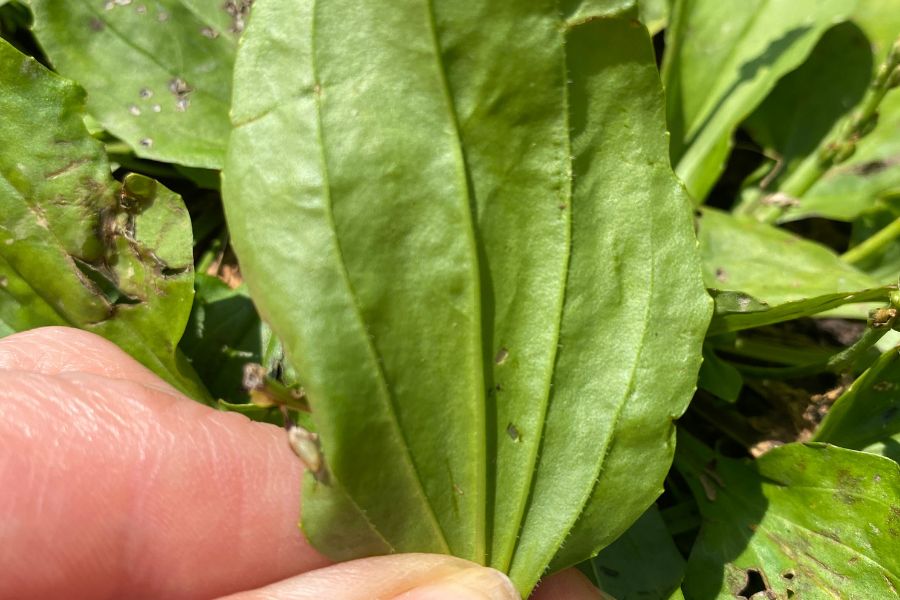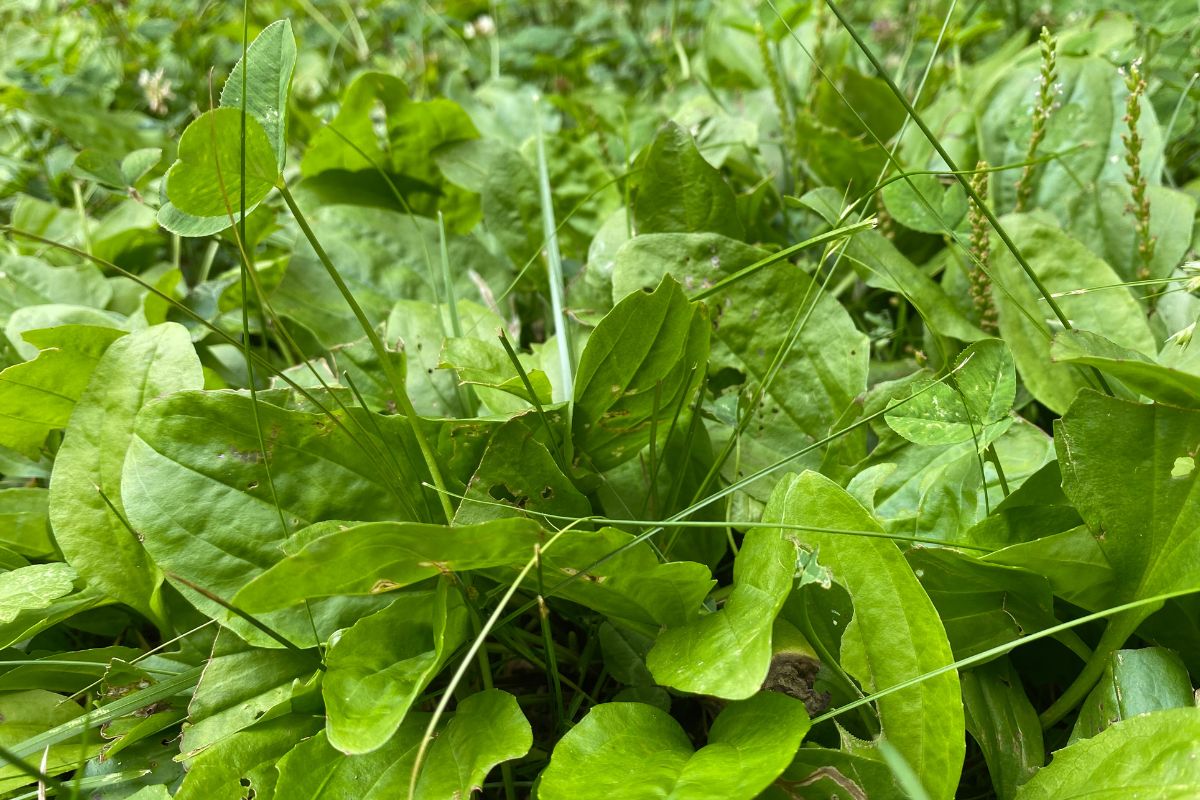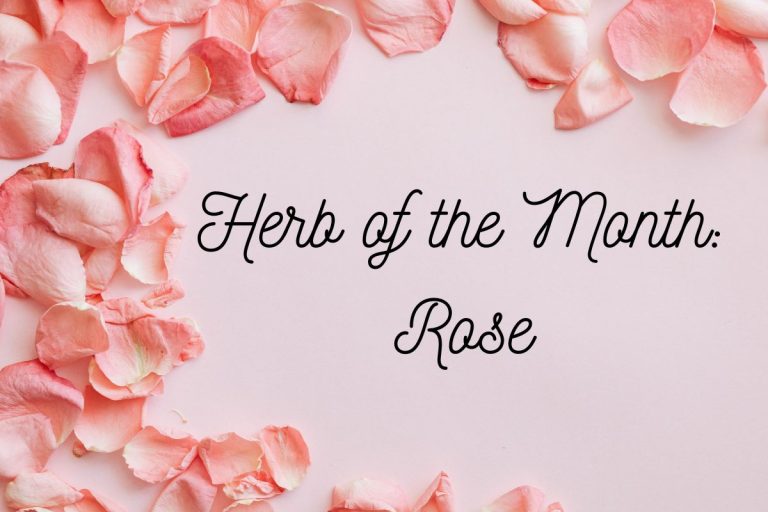August Herb of the Month: Plantain!
This post may contain affiliate links. View our disclosure policy here.
I recently found a tick on my hip. UCK! I’ve already spent over a year doing things to strengthen my immune system and combat chronic Lyme disease. Therefore, I don’t take lightly to tics on my body. I was also irritated with myself for not being able to find my oregano oil for cleaning the site. But I did find my favorite tinctures that I like to have on hand and use for several weeks after such an incident. However, a fellow blogger friend of mine reminded me I also could have applied plantain to the site. Ah, yes! Plantain. That very easy to find (at least in my yard) herb that is so easy to overlook. So this month I decided to review my notes and sources and write about plantain. Because there may be a few of you that overlook this wonder herb too!
Plantain is often overlooked and I’m not sure why. It’s so common. It’s pretty much everywhere there are people. And as you will see, it’s highly beneficial! Read below and see how plantain is wonderfully beneficial to the digestive system, mucosal tissues and more.
The Basics of Plantain
Family
Plantaginaceae
Latin Name
Plantago major, rugelii, lanceolata
Medicinal Parts
Primarily the leaves, though the seeds are beneficial too!
Energetics
Cooling, moistening, tonifying
Taste
Slightly bitter and earthy, slightly salty
Actions
anti-inflammatory, antimicrobial, astringent, demulcent, diuretic, emollient, expectorant, hepatoprotective, nutritive, vulnerary
The Benefits of Plantain
The ‘Band Aid’ Plant
Plantain could easily be called a band aid plant because it’s biggest use is for cuts and scrapes! Plantain encourages healing with cuts, scrapes, bug bites, bee stings and more.
Plantain is especially good for itching. With this in mind, rubbing plantain on a bite may even help a child refrain from scratching! Next time you have a bug bite, grab a leaf of plantain, chew it up a bit (you can make a paste in a pestle or a mini blender if you prefer), and rub it on. You just may be considerably impressed.
Plantain can draw things out too so it can work for a splinter, a small sliver of glass, or yes, as my friend reminded me, even toxins from a bug or tick bite. Sometimes splinters can be drawn out in minutes, other times you may want to cover the plantain paste/poultice with a band aid and leave it on overnight to work it’s charm!
Poison Ivy and Rashes
Plantain is often used as an herbal wash or poultice in treatment of poison ivy and other itchy rashes. You can make a wash much like you would a tea. Simply brew the leaves as you would a tea in a large amount of water. Once cooled, you can use a rag to wet in the plantain wash and wash the area about 5-7 times throughout the day. One reference says drinking plantain tea through the day will heighten the effect of using the wash.
Wound Healing
Plantain is a vulnerary herb, meaning an herb that brings about healing. Plantain can promote the growth of new cells.
Usually when people speak of wound healing they are speaking of some sort of skin lesion but it can also refer to internal wounds. With plantain being a demulcent this is all the more true. Using plantain over a wound may even help to prevent scar tissue from forming. You may use the herb simply mashed up in a poultice, a salve or a compress.
The wound healing actions can help with eczema, surface wounds, ulcers, leaky gut, athlete’s foot and fungal skin infections, burns, sunburn, dermatitis, various rashes, and more.
Antimicrobial
While plantain will not take on an infection all by itself, it does have some antimicrobial action. In simple terms, this means it can help other antimicrobials do so whether herbal or pharmaceutical. What plantain does is break up the biofilm of the bacteria. Pretty cool stuff.
Liver Health
Because of plantain’s hepatoprotective it protects your liver from damage. This means it plays as a sort of assistant to liver health when you are exposed to chemicals or other toxins.
This doesn’t mean you can drink plantain tea and then think you have Happy Hour every day or keep eating other foods with chemicals and toxins and be fine. It means with a healthy diet and lifestyle, plantain tea is one more tool for your wellness basket to strengthen your livers natural abilities.
Astringent
An astringent herb is one that draws water out of tissues, causing them to shrink. For example, in skin care, using astringent herbs along with gentle cleansing can temporarily tighten the skin, shrink pores, and remove oil.
However, some astringents can be extra drying, especially when used in excess, and are not suitable for every skin type.
Plantain has very gentle astringent action. This, with its’ ability to break up biofilms as mentioned above, makes it a great choice in helping with gingivitis. Additionally, it may also help (along with other conventional or natural methods) assist with dental abscesses.
Nutritive
While not always the tastiest, the leaves do contain a variety of nutrients. Don’t let what I said about taste sway you though. Just start out with the tinier, younger leaves.
It is a good source of fiber. Plantain also hosts a number of minerals such as copper, calcium, potassium, magnesium and zinc. Plantain also contains vitamins A, C, and K.
Harvesting the Herb of the Month:Plantain

Here’s a short video on harvesting plantain for salve. You can follow the same steps for tea making as well.
I found a good video on YouTube for addressing harvesting plantain shoots. I just may have to try this out soon!
Working With Plantain – the Herb of the Month!
Edible Salad
Some people do add plantain to their salads just like dandelion leaves.
You can eat the leaves. The younger the leaves, the better they taste. Whereas the older leaves get a bit bitter (just like dandelion).
As the leaves of the plantain plant age, they tend to also become more stringy and tough. Older, larger leaves are better suited for teas, salves, and tinctures.
As a side note, if you don’t like the leaves in your salad, try a stir-fry where the flavors may mix in more with your tasty vegetables and preferred sauce.
Plantain Tea
Plantain tea is great to get the constituents of the plant into your entire digestive system. It works fairly quick for internal inflammation and wounds. There’s a great ‘gut heal’ tea in my favorite herb book: Herbal Medicine for Beginners by Katja Swift and Ryn Midura.
Plantain Paste/Salve/Compress
One can certainly purchase a plantain salve on Amazon here. Or you can make your own. You can find directions in the book I mentioned – Herbal Medicine for Beginners!
For a quick paste in a hurry, just grab a leaf, chew it in your mouth or mix it in a blender and paste it on the bee sting, bug bite or whatever needs the quick first aid!
You can either make a strong tea and soak a washcloth in it for a compress, or even just chop the leaves up fine and put them in some moist cheesecloth and do your compress that way. Make sure to do it a few times a day!
Considerations for this herb of the month:
Plantain is a very safe herb but the husked seeds can be a bulking laxative. For this reason it should not be taken within two hours or so of any prescription drugs as the action of the plantain may make the drug less effective.
Supplies For Working With Herbs
Wanting to learn more about herb and make your own teas, tinctures, and more? For the purpose of learning, start by reading more herb of the month posts (see some listed below). Additionally, here’s a few more books and supplies you may want as you get started.
Wild Medicine: How to Forage Healing Foods and Craft Your Own Herbal Medicine
Herb Scissors Set – not a necessity but I was inspired when I saw a recent video with someone using them!
Tea Infuser – I’ve tried a number of varieties of infusers and I really like this kind. It’s simple to use in mugs and mason jars when making a larger amount. And they are much easier to clean out too!
Making Your Own Herbal Tea – get more information and ideas in this post!
Herb of the Month: Plantain – Conclusion
It’s amazing how the plants so often seed as roadside or yard weeds are actually medicinal herbs! There’s so much you can do with this little green plant!
Plantain is used for skin infections, inflammation, bee stings and so much more. Keep reading more sources on herbs and increase your own self-awareness and knowledge of plantain and other medicinal herbs.
Come back and let me know what you think of this herb of the month! Share with me about plantain after you have worked with it. Let me know if you tried it in salad, tea, salve, or another way.
Don’t Miss Out on These Herb of the Month Posts and More!
Earthley Products – this post introduced you to Earthley Wellness- a company that sells amazing herbal remedies and other natural products made with herbs.
Disclaimer – Just a little reminder here that I am NOT a medical doctor or medical professional of any kind. I’m simply a Christian woman who loves exploring herbalism and other areas of achieving optimal health in a holistic approach. I also love writing and sharing with others all the things I am learning! Be sure to continue reading posts here and also explore a variety of other resources to further your education and knowledge! And always try to apply what you learn as you travel your own wellness journey! See my disclaimer page.








So many great ideas and uses for plantain! Creating a plantain wash for poison ivy and rashes is brilliant!
I’ve been amazed at how well just chewing up a leaf and applying it to a bite takes the sting and/or pain away so quickly.
I love your site. I am interested in herbalism and how I can essentially protect my family from disease and ailments. You have a new subscriber!
I’m so delighted you found me! Herbalism is definitely a BIG part of this blog!